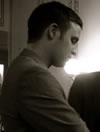
Introducing Ian Klinke
Dr Ian Klinke is a post-doctoral research fellow at the University of Oxford.
Geopolitical Passport
Your relationship with geopolitics
1. At what age did you discover geopolitics and what attracted you to it?
I got told off in 1991 by my primary school teacher for making a finger puppet of Saddam Hussein instead of Punch and Judy.
Ironically, I was drawn to geopolitical writing precisely after having decided to avoid military service. Whereas many of my friends went off to the barracks to wait for a large territorial army to emerge on Germany’s borders, I worked in a home for the elderly (and obviously had to compensate on some level).
My fascination with the work of Kagan, Kissinger and co. was cast in a different light when I was moved to the hospice part of the home, where a number of dying Wehrmacht soldiers wanted to sit over maps with me and talk about their personal experiences of struggling for Eastern living space. Some of these men had killed civilians, even minors.
These conversations were formative to my world-view and therefore also my engagement with geopolitics.
2. Which geopolitical topics have your focus and why did you choose especially these?
My work explores German geopolitics and European integration with a particular interest in the legacy of the Cold War. I’ve written about a number of topics including the return of Cold War geopolitics in debates on German energy security and the intriguing blend of geopolitics and Marxism-Leninism in contemporary Belarus.
Other work has addressed the concept of chronopolitics, specifically the role of the ‘postmodern’ in EU policy and strategic discourses on Russia. More recently, I’ve examined resemblances between contemporary area studies and Cold War era Sovietology, focusing in particular on the policy-academy nexus.
3. What do you consider your most important contribution to geopolitics?
It’s still early days.
Your geopolitical preferences
4. What is your favourite definition of geopolitics ?
I like to think of geopolitics as undead. Like the violent figure of the zombie, geopolitics may be dismembered effortlessly, but it nevertheless endures.
The analysis of geopolitics then, I have argued, is a kind of post-mortem vivisection, even a mummified geopolitics can suddenly awaken and infect you with its logic.
5. Which geopolitical scientist do you admire the most
Oh dear. I tell my students that the critical study of geopolitics is a collective struggle, which only history will judge!
No, of course I admire the work of individual scholars in the field (both critical geopolitics 1.0 and 2.0, both established and emerging), but hope it’s OK not to single one of them out here.
6. What is your favourite geopolitical book?
Not sure I have one.
I very much enjoyed reading Yuri Andrukhovych’s “Twelve Rings” a few years ago. It manages to capture the neo-colonial geographies of post-Cold War Europe through the medium of fiction.
The film “Import/Export” by Ulrich Seidl does so in a very similar way, too.
7. What is your favourite geopolitical website?
It has everything critical geopolitics likes to dissect (and thereby inadvertently fetishises):
- obscure geopolitical podcasts
- sinister Cold War propaganda cartoons
- neo-fascist music from Croatia
- outrageous Reagan speeches
- overly honest EU press conferences,
- hyper-masculine army recruitment ads
- and so on.
The geopolitical future
8. In what direction(s) will geopolitical science be heading the coming decades?
I’m no astrologist and would hesitate to make predictions, but I will follow closely whether new crises of global capitalism will lead to a return of classical geopolitics in its more vulgar, perhaps even neo-fascist, form. I hope not.
9. Which geopolitical subject has been too little in the spotlight and needs further research?
I’m not sure whether we have quite understood the intersection of geo- and biopolitics. Whether we agree or not that the camp is the hidden spatial matrix behind modern politics, it is clear to me that something survived the scorched earth and gas chambers of Nazi living space.
I believe that we can, for instance, encounter this something in the now largely obsolete space of the nuclear bunker, which I read as a tomb-like subterranean living space that materialises a genocidal fantasy. I’m currently fleshing these ideas out through an analysis of a particular site that served both as a nuclear shelter and an underground concentration camp.
10. What will be the largest geopolitical challenge for the world in the 21st century?
I would expect ‘geopolitical science’ to continue doing what it has always done, to describe and predict shifts in the balance of power (the decline of American power, rise of China etc.).
The critical study of geopolitics, on the other hand, has since at least the 1990s followed developments in human geography, which, in turn, have largely been inspired by new ideas in social and cultural theory. I would expect this to continue.
